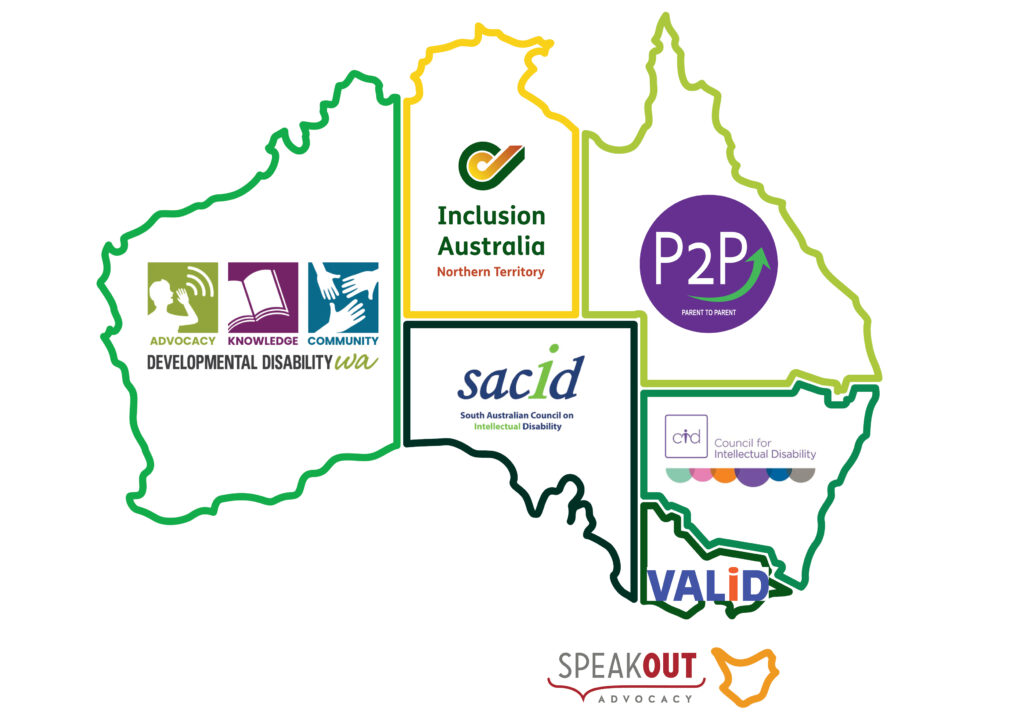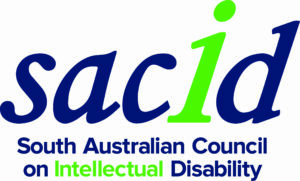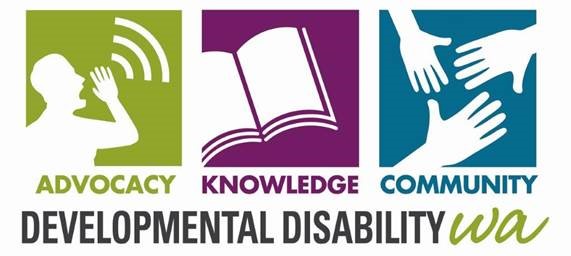
Inclusion Australia’s strength comes from our state members who use their combined experience and expertise to promote the inclusion of people with intellectual disability.
Our state members are:
- Council for Intellectual Disability (CID) – New South Wales
- Victorian Advocacy League for Individuals with Disability (VALID) – Victoria
- Parent to Parent (P2P) – Queensland
- Speak Out – Tasmania
- South Australian Council on Intellectual Disability (SACID) – South Australia
- Developmental Disability Western Australia (DDWA) – Western Australia.
Together we form a network that is connected to people with an intellectual disability and families, and committed to the shared vision of inclusion in all aspects of Australian life.
Each of our members have many years of experience of advocacy across local, state and national governments as well as international agencies, such as the United Nations.
Council for Intellectual Disability (CID) – New South Wales
Council for Intellectual Disability (CID) is a disability rights organisation led by people with intellectual disability. We have worked for more than 65 years to make sure all people with intellectual disability are valued in the community.
People with disability are at the front and centre of everything we do – as Board Directors, staff members and spokespeople. We work to build a community that protects rights, includes everyone and supports people well. We focus on issues that people with disability say are important, such as the NDIS, health, jobs, education, transport and safety.
- CID promotes human rights. We help people with disability to be heard, speak up on the big issues and campaign for change.
- Through our Inclusion Services branch we advise organisations on how to be more inclusive, so that our society is equal and accessible.
- We believe people with disability should have the same opportunities as everyone else. Through our funded projects, people with disability, their families and supporters can learn and build skills, and actively participate in the community.
Victorian Advocacy League for Individuals with Disability (VALID) – Victoria
VALID has been leading the way advocating for people with disability in Victoria since 1989. In this time VALID has helped people with disability and their families to be more confident and in control, and to improve the services that support them. VALID has fought to make our communities, laws and regulations fairer and has developed training tools, information and resources for people with disability and their families across Victoria.
VALID has extensive experience managing projects and working with state and federal government including programs that support empowerment, choice and control such as the Keys to Success and Parents as Planning Partners.
VALID has also lead supported decision-making in Victoria, starting peer action groups across the state and supporting people with intellectual disability to self-advocate and become leaders.
VALID manages a group of programs that link training, individual and systemic advocacy, peer support and community development and provide protection, safeguards and capacity building for people with intellectual disability and their communities.
VALID has set up a community development team to help build sustainable changes in mainstream services to make them more inclusive of people with disability. Their work includes hosting the Victorian Inclusive Community Development Network – for people with disabilities and disability professionals interested in inclusion.
Parent to Parent (P2P) – Queensland
Parent to Parent, also known as P2P, is a not for profit organisation, formed in 1988 by a group of parents, concerned about the future for their sons and daughters who had a disability. Their goal was to support each other and to initiate positive change in the lives of all people living with disability.
Our membership consists of people with a disability and those who support them. We represent and are accountable to our members. Staff may also have lived experience of disability or have a family member with a disability. This connection to the lives of people with a disability is what makes P2P the organisation that it is.
We strive to set an example of the importance of respecting people with disabilities, upholding their human rights and recognising their value as contributing members of a diverse and inclusive society. We work with parents and carers on their journey to support the person with a disability to access opportunities and exercise their right to choice.
We recognise the role of family, friends, neighbours, colleagues and the community when people with disabilities interact with government systems, for example education and health.
We are pleased to support Loud and Clear Qld, a Sunshine Coast based self-advocacy group. Loud and Clear members raise awareness of key issues that are important to people with intellectual disabilities.
We assist people with their NDIS plan through Plan Management. We help people achieve their dreams and goals through Planning Alternative Tomorrows with Hope (P.A.T.H.).
Speak Out – Tasmania
Speak Out Association of Tasmania, also known as Speak Out Advocacy is a state-wide, independent, non-government organisation that aims to develop a respectful and inclusive community by promoting and defending the rights of people with disability.
We provide individual advocacy and support people with disability to: speak up and be heard, get information, work with the NDIS, know and claim their rights, make decisions, make a complaint; and be represented when needed. These services are free and confidential.
Speak Out is also a membership organisation for people with intellectual disability. Self-Advocacy groups and Peer Support groups meet each month across the state. The annual Speak Out Self Advocacy Conference, is the longest running conference for people with disability in Australia.
South Australian Council on Intellectual Disability (SACID) – South Australia

The South Australian Council on Intellectual Disability Incorporated (SACID) is a state-wide not for profit organisation. SACID was founded in 2006 to work towards achieving a South Australian community in which people with intellectual disability are involved and accepted as equal participating members.
This is achieved through consultation with stakeholders, advocating for an inclusive community, promoting the rights of people with intellectual disability and delivering capacity building activities for people with intellectual disability and their families.
SACID is the South Australian representative of Inclusion Australia. We speak up about issues that are important to people with intellectual disability and their families in our state on a national level.
We have people with intellectual disability and family members represented at every level of our organisation (Board, reference group, staff, members) to make sure we are doing work that people with intellectual disability and their families really want.
We support people with intellectual disability to access advocacy services if needed. We also promote the human, legal and civil rights of people with intellectual disability and speak up when rights are not being upheld.
We offer capacity building activities for people with intellectual disability and their families and we work on projects that support all of these goals.
Developmental Disability Western Australia (DDWA) – Western Australia
Developmental Disability WA was established in 1985 and is a trusted source of independent information, advocacy, education and support for people with intellectual and other developmental disability, their families and the people who support them.
DDWA offers free membership to individuals and family members and others who have an interest in advancing the rights and needs of people with disability.
DDWA works in three main ways:
- Advocacy:
- To support people with developmental disabilities and their families to have a strong voice and seek change where needed.
- To influence government and other decision makers to make positive and lasting change.
- Knowledge:
- To build the expectations and capacity of people with developmental disability and their families.
- To inform people and families about their rights, choices and options to equitable services and supports.
- Community:
- To support people with developmental disabilities and their families to live their everyday lives.
- To partner with others to develop more connected and inclusive communities.





